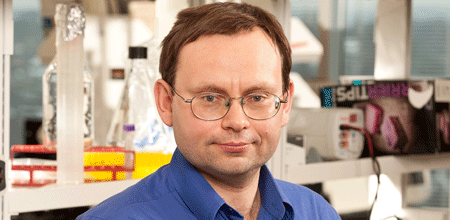Newly enlisted T-cell 'policemen' can slow down run-away immune system, scientist says

In research published in the March issue of Immunity, Saint Louis University scientists led by Daniel Hawiger, M.D., Ph.D., assistant professor of molecular microbiology and immunology, have discovered that potentially aggressive T-cells that might lead to auto-immune disease can instead be enlisted to help "police" over-active immune responses, via the molecule CD5.
The immune system maintains health by avoiding the dangers of over- and under-responses. People with immune systems that do not efficiently fight off pathogens, like viruses or bacteria, will become sick. On the other hand, an immune system that is too robust may develop autoimmune diseases.
Hawiger and colleagues from his laboratory report a breakthrough in understanding the way regulatory T cells, which police other T cells' responses, develop. The first author of this study is Jacob Henderson, Hawiger's graduate student. Other researchers on the study include Adeleye Opejin, Andrew Jones and Cindy Gross from Hawiger's laboratory.
T-cells, the immune system's fighters, are trained to distinguish between self and non-self, with most learning tolerance for self.
During the T-cell education process, however, a group of T-cells always develops that remain self-reactive and might turn their attacks on the body's own cells. These self-reactive T-cells are responsible for the sort of friendly fire that leads to autoimmune diseases like multiple sclerosis.
"There is a need to keep those T-cells in check, because otherwise we would have a runaway immune system," Hawiger said.
Hawiger and his group report a mechanism for how potentially self-reactive T-cells can instead be enlisted to become regulatory T cells that police other T cells' responses.
Most of the time, the immune system keeps self-reactive T-cells at bay by deleting them. Some of these self-reactive T cells may, however, be still useful for the immune system because they can also recognize foreign pathogens. The molecule CD5 helps these self-reactive T-cells survive, avoiding deletion.
Intriguingly, researchers led by Hawiger found that increased expression of CD5 also serves as a safeguard against autoimmunity by training these potentially auto-aggressive cells to become regulatory T cells, therefore minimizing the risk of autoimmune disease.
"What we discovered is that there is a mechanism that can specifically push those self-reactive T-cells to become 'T-cell policemen,'" Hawiger said. "They become T-cells that can regulate other T-cells' responses."
The immune system usually tries to re-use mechanisms that are already in place rather than to reinvent new pathways. In this case, CD5 retrains these existing self-reactive T-cells as a way to re-direct their focus of attack.
The survival and retraining of these aggressive immune cells that might otherwise have been deleted by the immune system or, left un-checked, harmed the body, instead appear to offer a benefit to the body's immune system.
"So increased expression of CD5 - the very molecule responsible for keeping these potentially auto-aggressive cells alive - pushes some of these T-cells to become policeman, minimizing the risk of an autoimmune response," Hawiger said.
Hawiger hopes that these breakthroughs will open the door to design better treatments for autoimmune diseases.
More information: Immunity, www.sciencedirect.com/science/ … ii/S1074761315000850


















